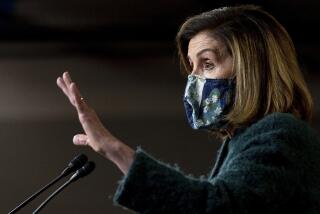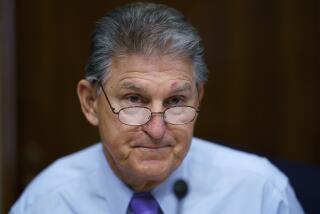Obama must spend wisely
The economic crisis has given Barack Obama an unexpected gift: spending money. The president-elect is drafting a stimulus plan that will reach $775 billion or more, enough to fund almost every project he mentioned during the campaign. But like many gifts, this one comes with dangers.
All across the nation, politicians and policy wonks are happily making lists of what they hope to find under a post-Christmas stimulus tree. State governors have asked for $136 billion for construction projects they have declared -- in Washington’s favorite new term -- “shovel ready.” Mayors have chimed in with $97 billion of worthy ideas, from sewer repairs in Milwaukee to a beach parking lot in Ventura. University presidents, mass-transit proponents and national park advocates all have their hands out. Obama too has talked about using the stimulus package to help pay for his favorite priorities -- not only for traditional infrastructure projects such as roads and bridges but for promoting alternative energy, modernizing schools, improving healthcare, even expanding access to the Internet.
The danger is not just the obvious hazard of running up a deficit that becomes a burden after the economy recovers; Obama has promised to be vigilant on that score. The more subtle problem is that as stimulus spending grows, it could become less focused -- and less effective.
For a stimulus plan to be effective, the money must get into the economy fast. One of the defects of this year’s income tax rebate was that it took months to reach taxpayers, and when it did, relatively few spent the money on consumer goods. (Instead, many used it to reduce debt -- wise for them, but not as good for the economy.)
A virtue of infrastructure spending is that it creates both jobs and public benefit in the form of better roads, or sewers, or schools or beach parking. But will it be fast enough? That depends on how many of those shovel-ready projects are really ready to go and how many are just gleams in a governor’s eye.
The stakes are high, and they’re not only economic. If Obama can fashion a stimulus plan that works, he’ll be claiming a huge political prize. A generation of voters reared on Ronald Reagan’s dictum that government is the problem will instead see the federal government acting as a solution -- just when they needed one most.
If he fails, he’ll reinforce citizens’ skepticism of the government’s ability to solve problems -- skepticism that has often made them mistrust Democratic proposals that smacked of big government.
“There’s a trust issue in the middle of this,” says William A. Galston, a former Clinton administration official. “Why should we take tens of billions of dollars of our money and pour it down a rathole?”
As he designs the stimulus plan, Galston argues, Obama should use it as a vehicle not just to heal the economy but also to restore citizens’ trust in the federal government’s ability to act effectively and efficiently.
That means starting with projects that will make a visible difference in people’s lives. (Expect to see President Obama next year with a shovel in his hand.) But it also means imposing real restraint on spending because if the stimulus plan looks like a collection of pork-barrel projects or a traditional liberal wish list, the ghost of Reagan will suddenly reappear.
Obama hasn’t yet drawn clear boundaries around what kind of spending belongs in the stimulus package, and he should.
Here’s a question he should ask: Is the project temporary and designed to run only until the economy recovers? If so, great. But the administration shouldn’t yield to the temptation to pay for long-term programs out of the fund as well.
Take the long-standing proposal to expand state health insurance for children. It’s a worthy cause, and Congress should fund it. But not as part of an economic stimulus package, because it’s not meant to be temporary.
“When a locomotive is leaving the station, there’s a natural temptation to hitch as many cars to it as possible,” Galston says. “It’ll be a real challenge to the president to maintain his focus and credibility.”
Fiscal conservatives will argue as a matter of course that the stimulus package should focus only on refloating the economy, not on expanding the reach of the federal government. Liberals who want to restore the standing of activist government should put away their wish lists and agree.
Doyle McManus will begin writing a weekly column from Washington next month. [email protected]
More to Read
Get the L.A. Times Politics newsletter
Deeply reported insights into legislation, politics and policy from Sacramento, Washington and beyond. In your inbox three times per week.
You may occasionally receive promotional content from the Los Angeles Times.











